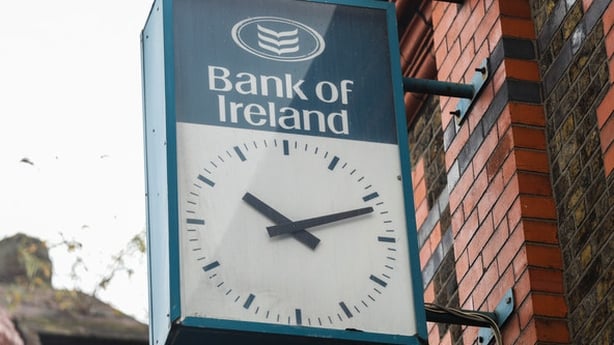Bank of Ireland has today increased its returns to shareholders after a 4% fall in full-year pretax profit and said further consistent deposit and loan book growth would support a progressive dividend policy up to 2027.
The bank’s shares rose in Dublin trade today.
Ireland’s biggest lender provided estimates for 2026 and 2027 for the first time today, saying it expected the Irish economy to expand by more than 3% each year with its deposit and loan books to grow by 3% and 4% respectively a year.
That would translate into net capital generation equivalent to around 45% of the bank’s end-2024 market cap from 2025 to 2027, it said, supporting a dividend payout ratio of 40-60% with further share buybacks expected next year and potentially beyond.
“We’ve had a strong and profitable 2024, we’ve now completed year two of a three year strategy – that strategy is working very well,” said Bank of Ireland Group CEO Myles O’Grady, speaking on RTÉ’s Morning Ireland. “The macroeconomic backdrop is supportive and indeed our business model continues to be well positioned to benefit from this.”
While US President Donald Trump’s pledges to cut corporate tax rates and impose tariffs could pose a challenge to Ireland’s foreign multinational-focused economy, Mr O’Grady said Ireland faces any potential fallout from a good position.
We need your consent to load this rte-player contentWe use rte-player to manage extra content that can set cookies on your device and collect data about your activity. Please review their details and accept them to load the content.Manage Preferences
“The export sector in Ireland is performing well despite these challenges and the potential risk of trade dislocation – most sectors are seeing growth, pharma up 18%, technology up 19%,” he said. “So I would point to the maturity of the sector, more than 40 years building up our proven capability”.
“Access to the European Single Market remains key, foreign direct investment overall to Ireland is a source of stability for the Irish economy,” he added.
Bank of Ireland said its full-year pretax profits slipped to €1.86 billion from €1.94 billion a year ago.
The bank said it plans to return €1.22 billion to shareholders through a mix of dividends and share buybacks, equivalent to 80% of its earnings. That compared with a total distribution of €1.15 billion a year ago.
The bank delivered a return on tangible equity (ROTE) of 16.8% and expects a ROTE of 15% this year, before growing above 17% by 2027.
Bank of Ireland also set aside €172m to cover possible costs related to a UK industrywide probe into motor finance commissions.
It said this was its best estimate of potential redress and compensation but that it was possible the financial impact in future periods could be materially higher or lower.
Bank of Ireland said its net interest income came to €3.565 billion, in line with guidance and supported by growth, particularly in Ireland.

It was down slightly on 2024, due in large part to rate cuts by the European Central Bank. They are expected to continue this year.
“As inflation continues to reduce, we can expect ECB rates to fall,” Myles O’Grady said, adding that the bank’s interest income is expected to hold up despite this.
“We expect interest income to remain strong, supported by growth in our balance sheet, growth in our deposits and of course managing that rate environment as well,” he said.
He said the bank would continue to pass through future rate cuts “appropriate” and that it was well-positioned to compete with the growing number of players entering the Irish banking and mortgage market.
“We have four million customers, we compete across a range of different areas from the provision of current accounts, to mortgages, to business loans to complex corporate needs and to wealth customers as well,” he said. “We’re very comfortable to compete, and we expect to compete with both the traditional banks and, indeed, neo-banks also.”
Today’s results show that the bank’s Irish loans rose by 6%, while deposits were up 2%.
The lender said its total loan book increased by €2.8 billion to €82.5 billion, including a €3.2 billion increase across its Irish portfolios and a “modest” increase of €0.2 billion in Retail UK.
Its liquidity profile remains strong, supported by its retail franchise in Ireland as it reported a 5% increase in new customer figures.
Customer deposits were €103.1 billion, €2.9 billion higher on 2023, mainly driven by higher Retail Ireland volumes of €1.5 billion.
The bank said its business income of €764m, including share of associates and joint ventures, was 4% higher than 2023, which mainly reflected growth in its Wealth and Insurance and Retail Ireland businesses.
It said that across its Wealth and Insurance business, Assets under Management rose by 19% to €54.8 billion with net inflows of €4 billion.
Bank of Ireland said it has “significantly” improved its asset quality, with a reduction in its non-performing loans ratio to 2.2% at the end of 2024 compared to 3.1% at the end of 2023.
It made an underlying net credit impairment charge of €123m for last year, which it said reflected its loan loss experience, partially offset by a small release on model updates including macroeconomic assumptions, and a reduced quantum of management adjustments.




